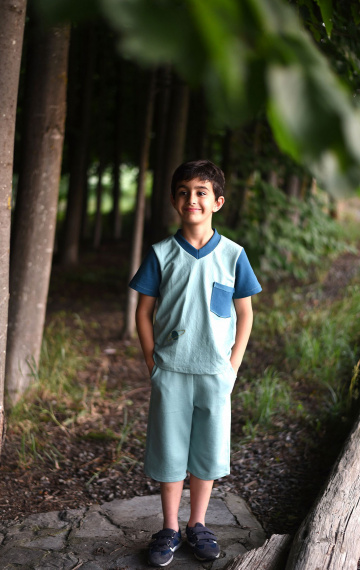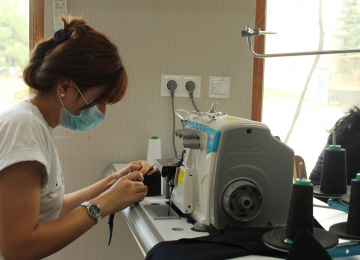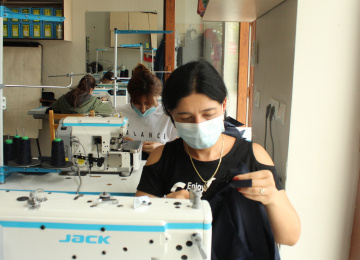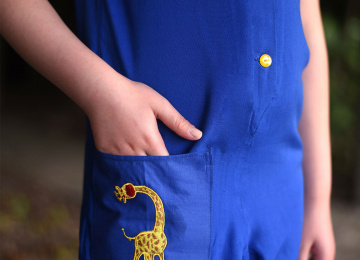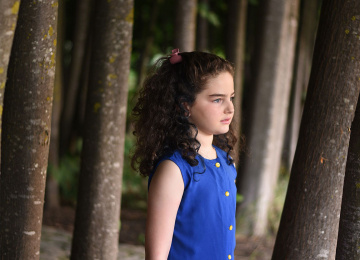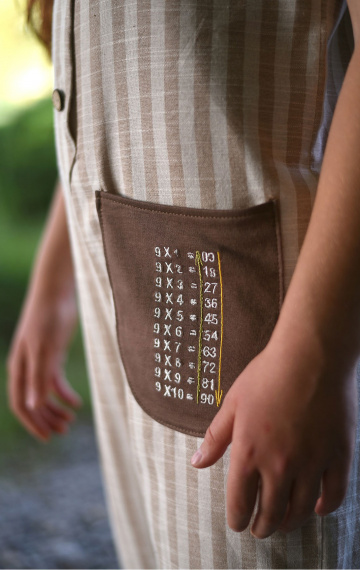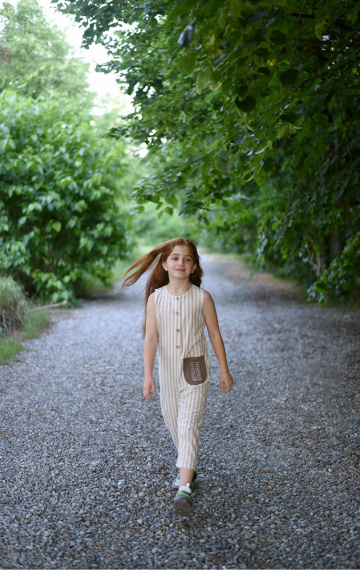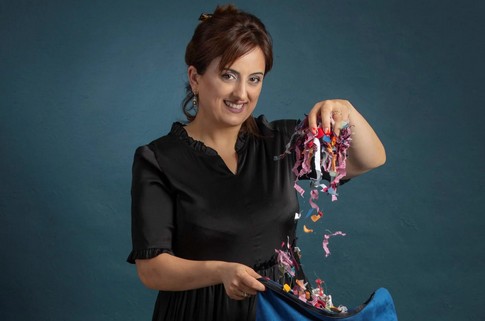
For years, Nino Giorgadze saw that women faced social and financial problems in her hometown of Gori, some 35 kilometres away from the unrecognized breakaway region of South Ossetia. It got her thinking, what might these women do with passion and motivation that would bring them financial stability. And that’s how the LTD Leader social sewing enterprise came to be.
Leader, with its kids brand, is a member of the Georgian Apparel and Fashion Association (GAFA), which was established under the EU4Business Clusters4Development project, funded by the EU and the German government and implemented by GIZ. The association’s goal is to represent, promote and support Georgian apparel and fashion companies by improving their competitiveness on the local and international markets.
Focus on vulnerable women and girls
Shida Kartli region, especially its town of Gori were once famous for sewing enterprises. At least one person in every family around the town sewed well. Today, all the professions in the garment industry – seamstresses, constructors, and cutters – have a shortage of workers. This encouraged Nino Giorgadze to open an enterprise through which she could attract more people to find a career path in the sewing business—especially those in need.
To fill the gap, the enterprise launched courses for vulnerable women in the region, including the disabled, the financially challenged, the internally displaced, the victims of domestic violence, the single mothers, and those living in borderline villages. Today, these women continue to learn cutting, sewing, and modelling, and strengthen their entrepreneurial skills through training.
“There is a domestic violence shelter in Gori, and women who live there are especially in need of financial stability,” explains Giorgadze. “We teach them and help them to get a job and move forward.”
Some women finish learning and find jobs at other enterprises, while some stay and work at Leader. The enterprise that started with just three workers back in 2016 now employs 26 local women. And the support does not end with training or employment. More than a year ago, the social enterprise signed the principles of women's empowerment developed by UN Women under the name “Equality means business.” It was actively involved in a 16-day campaign against gender-based violence in 2021. And in 2019, Leader won a competition organized by the Millennium Challenge Corporation – Business for Gender Equality – to promote education, professional development, and advancement for women.
“We believe that the role of the private sector in tackling gender-based violence is crucial,” says Leader’s website.
Smart fashion is empowering
Empowering vulnerable groups of women is just one of the goals for Leader. Being eco-friendly and encouraging others to do the same is the second aim. At first, the enterprise worked hard to have zero-textile waste within their production. Soon Giorgadze and others realized that they were losing valuable resources, so they began to acquire and recycle textile waste from other enterprises and residents.
“We play a major role in the local ecosystem,” explains Nino Giorgadze. “Other enterprises have followed our example and started to think of the ways to reduce or eliminate textile waste completely”.
The enterprise won the Corporate Sustainability Award Competition organized by the Global Network of Georgia in 2021 in the category: “Sustainable Consumption and Production.”
Leader’s eco-friendly production is associated with the greenery and brightness, and Giorgadze thought that the lemon encompasses both of these things. That is how, two years ago, Leader came up with an idea to call the children's clothing brand Lemo and started producing unique, exclusive, distinctive styles of clothes for children aged 2-12. After hard work, the company was preparing to open two stands in shopping malls around Tbilisi. Just then, the pandemic hit, and Leader had no other choice but to close down those stands, go digital and open an online shop. The enterprise quickly adjusted to the new reality and started producing something that was indeed in very high demand: face masks.
The local market is not the limit for Leader: 50% of its clothes are exported outside Georgia. Some items are even sold on Amazon and Etsy, two of the major international online retailers. But more importantly, these clothes look nothing like standard kids’ wear. The images embroidered on Lemo’s clothes are carefully designed by psychologists with the aim of developing social and cognitive skills.
“One of the images we use shows gender equality,” says Giorgadze. “When it’s right there, on your pocket, kids can ask what it is and what it means – and we hope they get good answers from an early age.”
Lemo mixes sophisticated designs with calming colour schemes and comfortable designs, making clothes with meaning. From taking care of the earth to the multiplication table to planets and geometric figures, Lemo covers a wide range of topics of interest to the target age groups.
“One girl even wrote a blog saying she bought overalls, wore them through the summer and learned how to multiply the number 9,” recalls Giorgadze. “What a clever way to say it.”
Giorgadze and her company have been able to reach their more ambitious goals with support from the EU4Business initiative of the European Union. When the company couldn’t get the fabrics it needed in Georgia, GAFA put them in touch with a textile association in Turkey. It also helped Leader staff gain the necessary skills and knowledge to be the most competitive in terms of sustainable production, product quality, fashion design, skilled labour, and international branding.
“Support from the Clusters4Development project and GAFA in particular is crucial for textile enterprises like ours,” explains Nino Giorgadze. “I can say that without any exaggeration. They provide everything you need to develop in this field, from bringing in an expert to networking, exhibitions and beyond. We would not be able to achieve such high goals on our own.”
With support, Leader continues to reach new horizons. The company is discussing possible export opportunities with Estonia and preparing for ISO certification with GAFA’s support. It also wants to open those two stands that needed to close down because of the pandemic back in 2020.
“Above all, this year we will be able to recycle over 13 tonnes of textile waste and hope to double recycling volumes next year,” says Giorgadze.

